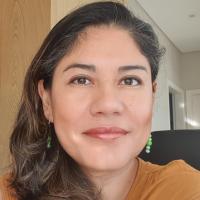
Kleinsy Bonilla
Latin America & Caribbean
Guatemala
I see OWSD in Latin America as a dynamic community of women scientists who address the current challenges of engaging in science activities in challenging contexts, particularly in their condition as female researchers.
Vision statement
I see OWSD in Latin America as a dynamic community of women scientists who address the current challenges of engaging in science activities in challenging contexts, particularly in their condition as female researchers. It is important to articulate the different levels of action: starting from the national context, moving to the regional and the global approach.
Some elements of my work plan, include:
1. Encourage the establishment of more National Chapters in the region. As of March 2021, there are 6 National Chapters established out of 22 countries in the region.
2. Encourage a closer approach and collaborative work among the members of OWSD from Latin America, through research collaborations, scientific visits, dissemination of different existing initiatives and opening new opportunities.
3. Increase the systematic dissemination of the opportunities that OWSD offers to all its members. This will help the region to achieve greater use of Ph.D. scholarships, financial support for early career and recognition through awards and distinctions.
4. Link OWSD Latin America with the other regions that make up OWSD. An example of this was the OWSD Guatemala-OWSD South Africa pilot plan for the review of scientific manuscripts in English.
5. Encourage further growth of OWSD membership in Latin America and its interaction with other stakeholders and stakeholders of science, technology and innovation through practices and processes of Scientific Diplomacy.
Candidate’s bio
Dr. Kleinsy Bonilla is a Guatemalan woman scientist who has followed a long path to build a solid identity as a researcher. It required the exposure to several experiences for her to fully understand the complexity of engaging in scientific research, in part because she was academically formed in a context with extremely few female references in science. That is why she considers among her greatest achievements to have contributed to the formation of numerous Guatemalan (and Central American) young researchers through the promotion of networks and communities. In 2017 she became a member of the Guatemala International Network of Scientists and since 2019 she is Full Member of the OWSD Guatemala National Chapter. In March 12th, 2020, along with a group of Guatemalan women scientist, she established the OWSD Guatemala NC to promote activities to inspire children, adolescents and young scientists to pursue studies and career opportunities in STEM.
Dr. Bonilla obtained a Bachelor's degree in Social Sciences, and the professional titles of Lawyer and Public Notary from the San Carlos of Guatemala University (2005), completed successfully a Master's program in International Trade and Economic Cooperation from Kyung Hee University (2008) and obtained a Doctoral degree in International Development Cooperation from Kyung Hee University (2015), Republic of Korea. Her professional experience is focused in international relations, official development assistance, and economics of development. Her work has involved structuring collaborative processes between actors located in different countries. After she completed her graduate studies, she lived and worked in Seoul (Korea), Quito (Ecuador), Santiago (Chile) and Sao Paulo (Brazil). As for her research interests, she is engaged in topics related to socio-economic development, international cooperation for development, science and technology policy, and science diplomacy. In 2017 she joined the Institute of Geosciences (IG), Department of Science and Technology Policy (DPCT) at the University of Campinas UNICAMP where she is doing research addressing S&T capacity development in Central America, capacity building, scientific workforce in developing countries, and science diplomacy from the perspectives of Latin America. In addition, she continues activities affiliated to the Institute for the Development of Higher Education in Guatemala (INDESGUA). From this position she devotes particular efforts (since 2009) to promote networking among scientific communities in Latin America.











































